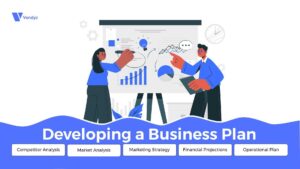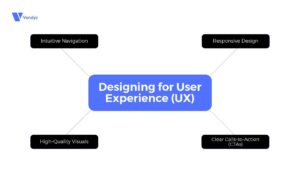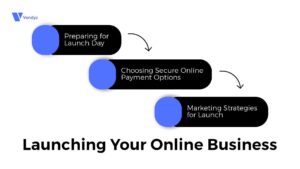How to Start a Successful Online Business in 2025

How to Start a Successful Online Business in 2025
Starting a successful online business can be an exciting and rewarding venture, especially in the rapidly evolving digital landscape of 2025. With the right tips, strategies, tools, and mindset, you can carve out a niche for yourself and build a thriving enterprise. This comprehensive guide will walk you through the essential steps to launch your online business successfully, from choosing your niche to scaling your operations.
Introduction
The online business landscape is constantly changing. Technological advancements, shifting consumer behaviors, and emerging market trends all play a role. As we move into 2025, understanding these dynamics is crucial for anyone looking to start a successful online business. Whether you’re interested in e-commerce, digital services, or online education, this article provides actionable insights and strategies to help you navigate this landscape effectively.
Choosing Your Business Niche
Identifying Market Opportunities
The first step in how to start an online business from home is selecting a niche that aligns with your interests and market demand. Here are some steps to help you identify potential opportunities:
- Self-Assessment: Reflect on your skills, passions, and experiences. What are you knowledgeable about? What do you enjoy doing? Your niche should resonate with your personal strengths.
- Market Research: Use tools like Google Trends, social media insights, and keyword research tools to gauge interest in various topics. Look for gaps in the market where consumer needs are not being met.
- Profitability Analysis: Evaluate the potential profitability of your chosen niche. Consider factors like pricing strategies, competition levels, and target audience willingness to pay.
Examples of Profitable Niches
In 2025, several niches are expected to thrive:
- E-commerce: With the rise of online shopping, niche e-commerce shops focusing on specific products or audiences can be highly lucrative.
- Digital Services: Offering services such as graphic design, web development, or digital marketing can attract clients looking for specialized skills.
- Online Education: The demand for online courses and training programs continues to grow as more people seek flexible learning options.
Conducting Market Research

Understanding Your Target Audience
Once you’ve chosen a niche, it’s essential to understand your target audience thoroughly:
- Demographics: Identify the age, gender, location, and income level of your potential customers.
- Psychographics: Explore their interests, values, lifestyles, and purchasing behaviors. This information will help you tailor your marketing strategies effectively.
Competitor Analysis
Analyzing your competitors is crucial for positioning your business if you want a successful online business in 2025:
- Identify Key Competitors: Look for businesses that offer similar products or services in your niche.
- Evaluate Their Strategies: Analyze their websites, social media presence, customer reviews, and marketing tactics. Identify what works well and what doesn’t.
- Find Your Unique Angle: Use this information to differentiate your business and develop a unique value proposition (UVP).
Creating a Unique Value Proposition (UVP)
Defining Your Brand’s Unique Selling Points
A strong UVP is essential for attracting customers in a competitive market:
- Identify Benefits: What benefits do your products or services offer? Focus on how they solve specific problems or enhance the lives of your customers.
- Highlight Differentiators: Consider what makes your offering unique compared to competitors—this could be quality, price point, customer service, or innovative features.
Crafting a Compelling Brand Story
Your brand story helps connect emotionally with customers:
- Share Your Journey: Explain why you started the business and what drives you.
- Incorporate Values: Highlight the values that guide your business decisions and resonate with your target audience.
Developing a Business Plan
Key Components of a Business Plan

A well-structured business plan serves as a roadmap for your online venture:
- Executive Summary: Summarize your business idea, goals, and key strategies.
- Market Analysis: Include insights from your market research and competitor analysis.
- Marketing Strategy: Outline how you plan to attract and retain customers.
- Financial Projections: Estimate startup costs, revenue forecasts, and break-even analysis.
- Operational Plan: Detail how you will run the day-to-day operations of your business.
Setting SMART Goals
Setting clear goals is vital for measuring success:
- Specific: Define clear objectives (e.g., “Achieve #1,000,00 in sales within six months”).
- Measurable: Ensure you can track progress (e.g., “Increase website traffic by 20% each month”).
- Achievable: Set realistic targets based on market conditions and resources.
- Relevant: Align goals with overall business objectives.
- Time-bound: Establish deadlines for achieving each goal.
Building Your Online Store
Choosing the Right E-commerce Platform
Selecting the right platform is critical for your online store’s success:
- Website Builders vs. Custom Development:
- Key Features to Consider:
- Payment gateways
- Inventory management
- Customer relationship management (CRM) tools like Hubspot
- Mobile optimization capabilities.
Designing for User Experience (UX)

A positive user experience can significantly impact conversion rates:
- Intuitive Navigation: Ensure visitors can easily find what they’re looking for.
- Responsive Design: Optimize your website for mobile devices since many users shop on their phones.
- High-Quality Visuals: Use professional images and videos to showcase products effectively.
- Clear Calls-to-Action (CTAs): Guide visitors toward desired actions (e.g., “Buy Now,” “Sign Up”).
Implementing Digital Marketing Strategies
Search Engine Optimization (SEO)
SEO is crucial for driving organic traffic to your website:
- Keyword Research: Identify relevant keywords that potential customers are searching for.
- On-Page SEO:
- Optimize titles, meta descriptions, headers, and content with targeted keywords.
- Ensure fast loading times and mobile responsiveness.
- Content Marketing:
- Create valuable content that addresses customer pain points (e.g., blog posts about 20 online business ideas).
- Use internal linking to improve site navigation and SEO performance.
Social Media Marketing
Social media platforms are powerful tools for brand visibility:
- Choosing Platforms Wisely:
- Focus on platforms where your target audience spends time (e.g., Instagram for younger demographics).
- Engagement Strategies:
- Post regularly with engaging content (images, videos related to social commerce).
- Interact with followers through comments and direct messages.
- Influencer Collaborations:
- Partner with influencers in your niche to reach wider audiences authentically.
Email Marketing Campaigns
Email marketing remains one of the most effective channels. You can use tools like Mailchimp, Brevo, or Convertkit to:
- Building an Email List:
- Offer incentives like discounts or free resources in exchange for email sign-ups.
- Crafting Compelling Campaigns:
- Personalize emails based on customer behavior (e.g., abandoned cart reminders).
- Segment lists to target specific groups with tailored messages about successful online businesses or the cheapest business to start from home.
- Analyzing Performance Metrics:
- Track open rates, click-through rates (CTR), and conversions to refine future campaigns.
Paid Advertising
Paid advertising can provide immediate visibility:
- Google Ads:
- Use search ads targeting relevant keywords to capture high-intent traffic.
- Social Media Ads:
- Utilize targeted ads on platforms like Facebook or Instagram based on user demographics and interests related to online filings or ecommerce businesses offerings.
- Retargeting Campaigns:
- Implement retargeting ads to re-engage visitors who didn’t convert on their first visit.
Launching Your Online Business

Preparing for Launch Day
A successful launch requires careful planning:
- Set Clear Goals: Define what success looks like on launch day (e.g., number of sales or website visits).
- Operational Readiness Checks:
- Ensure all systems are functioning properly (payment processing, inventory management).
- Create Buzz Ahead of Time:
- Use social media teasers or countdowns leading up to the launch date of your ecommerce shop or any specific product line you’re introducing.
Choosing Secure Online Payment Options
As you prepare for launch day, one critical aspect is ensuring secure payment options are in place to protect both you and your customers’ funds effectively:
- Consider using platforms like Vendyz which provide secure payment solutions tailored for e-commerce businesses (Vendyz). They offer robust security measures that protect sensitive information during transactions.
- Additionally, utilizing escrow services can safeguard transactions by holding funds until both parties fulfill their obligations (Learn more about escrow services). This method adds an extra layer of trust between buyers and sellers in any transaction process.
Marketing Strategies for Launch
Maximize visibility during launch:
- Leverage Social Media Teasers
- Share sneak peeks of products or services leading up to launch day.
- Host Virtual Events
- Consider live-streaming events or Q&A sessions about how successful is an online business? to engage potential customers directly.
- Offer Limited-Time Promotions
- Create urgency with exclusive discounts or bonuses available only during the launch period.
Scaling Your Business
Analyzing Performance Metrics
Once launched, continuously monitor performance:
- Traffic Analytics
- Use tools like Google Analytics to track website traffic sources and user behavior.
- Sales Metrics
- Analyze sales data to identify trends in purchasing patterns over time related specifically to online businesses that pay daily or other lucrative options available in 2025.
- Customer Feedback
- Encourage reviews and feedback through surveys or follow-up emails about their experience with your list of online businesses offered through your platform.
Adjusting Strategies Based on Data Insights
Adaptability is key in scaling your business:
- Refine Marketing Efforts
- Shift focus toward channels that yield the best ROI based on performance metrics.
- Product Adjustments
- Be open to modifying products or services based on customer feedback or emerging trends identified during market research phases regarding what is the most successful online business to start?
- Explore New Markets
- Consider expanding into new geographic regions or demographics once established in initial markets—especially if you’re exploring opportunities like how to start an online business in Nigeria?
Providing Excellent Customer Support
Establishing Communication Channels
Strong customer support enhances loyalty:
- Multiple Contact Options
- Provide various ways for customers to reach you (email support, live chat).
- Responsive Service
- Aim for quick response times; consider using chatbots for immediate assistance outside regular hours focused on inquiries about how to master online business?
Building Customer Loyalty
Loyal customers are invaluable assets:
- Loyalty Programs
- Implement rewards programs that incentivize repeat purchases.
- Personalized Experiences
- Use customer data to create tailored shopping experiences based on past behavior related specifically to their interests in successful online businesses they’ve engaged with before.
- Soliciting Feedback
- Regularly ask customers for input on their experiences; use this feedback to improve services continually while sharing new ideas such as top ten online businesses they might find appealing next!
Conclusion
Starting a successful online business in 2025 requires careful planning, strategic execution, and ongoing adaptation to market changes and consumer preferences—especially when considering how to start an online business from home or even how to start an online business from home for free! By following these steps—from selecting the right niche and conducting thorough market research to implementing effective marketing strategies—you can build a resilient online enterprise poised for growth in the dynamic digital landscape ahead.
Embrace innovation as you embark on this journey; stay informed about emerging trends; engage with your audience authentically; and always prioritize delivering value through exceptional products or services—these are the cornerstones of lasting success in the world of online business!